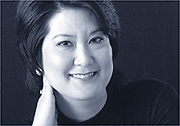


Changing Hawaii
ABOUT 30 years ago, a near-miss experience on Kauai showed that even a quick trip to the neighborhood store could be hazardous to the health. Campaign to buckle
up childrenOur entourage of visiting relatives from Honolulu had piled into an uncle's car.
My twenty-something cousin was driving, I was in the back and one of my siblings sat on somebody's lap on the front passenger side.
Our chariot bumped along the private dirt lane that merged onto the street. My cousin looked left, looked right and started to go.
Suddenly, a speed demon whipped around the corner, our driver stomped on the brake, and the toddler in front flew into the dashboard.
I can't remember if it was my little sister or brother, but I DO recall that kid crying loudly, incessantly and ending up with a big red welt on the forehead.
In those days, only goody-two-shoes wore lap belts and absolutely no one used car safety seats to cradle infants and toddlers from harm (Were such things even manufactured back then?).
There's no excuse today. All 50 states have laws requiring children to be strapped into safety seats or to be buckled up while riding in motor vehicles. In Hawaii, children younger than 3 must ride in federally approved child safety seats (The age will rise to 4 if Governor Cayetano signs HB 1).
Yet, it's still a way-too-common sight: a cute tyke standing in the front or back of a moving car, while the safety chair gathers cobwebs in the very same vehicle.
Veterans of the Parent War know why this happens. It's because most kids bawl like Akaka Falls when they are first buckled up, since their independent spirit absolutely HATES being restrained.
Doting grandparents, especially, acquiesce to such tantrums.
Thus the kiddie gets to shun the protection, with potentially hurtful consequences in an accident or near-miss.
The Keiki Injury Prevention Coalition (KIPC) to the rescue! Thanks to a $75,000 national grant, it has launched an enforcement-oriented media campaign aimed at increasing the use of child safety seats in the islands.
Part of that effort calls for increased ticketing of lawbreakers, with first-time offenders subject to paying a $100 fine and attending a l-o-o-n-g four-hour class on "Child Passenger Restraint System Safety."
ANOTHER offering of the KIPC campaign is a free "check-up" for anyone with a child safety seat in the family car.
This is especially important because, based on KIPC's experience, an estimated 95 percent of seats are improperly installed or used incorrectly. Ninety-five percent!
The next two drive-in check-up sites are at the Kokua Kalihi Valley Health Center on May 15 and at Honda Windward in Kaneohe the following Saturday, May 22. Both are scheduled from 1-4 p.m.
By the way, violations of the child safety seat law can be phoned into a hotline on Oahu at 538-3334 (1-800-868-7300 on the neighbor islands).
The registered car owner will then get a letter that reads, in part, "Recently, a concerned citizen informed the Keiki Carseat Hotline that on (date), at approximately (time), a vehicle registered to you with the (license number) was observed (description of infraction)."
Informants should consider it a good deed for a good cause: so that some unrestrained, unsuspecting little kid doesn't end up with a big red welt on the forehead from flying into the dashboard. Or worse.
Diane Yukihiro Chang's column runs Monday and Friday.
She can be reached by phone at 525-8607, via e-mail at
DianeChang@aol.com, or by fax at 523-7863.